BUSN 3700: ICJ Effectiveness and the India-Pakistan Dispute
VerifiedAdded on 2022/08/12
|9
|2252
|27
Report
AI Summary
This research paper examines the effectiveness of the International Court of Justice (ICJ) as the principal judicial organ of the United Nations. It explores the ICJ's role in resolving international disputes, emphasizing its function in maintaining global peace and security through the application of international law. The paper uses the case of India v. Pakistan, specifically the Kulbhushan Jadhav case, to illustrate the ICJ's operational activities and its impact on international relations. It analyzes the arguments presented by both countries, focusing on the alleged violations of the Vienna Convention on Consular Relations and the ICJ's provisional measures. The paper also discusses the ICJ's limitations, including its jurisdictional constraints and the binding nature of its judgments. Ultimately, the paper concludes that the ICJ serves as an important judicial body, despite criticisms, and is significant in shaping international law and state behavior. It highlights the ICJ's capacity to influence international law and the significance of its judgments in shaping the legal landscape.
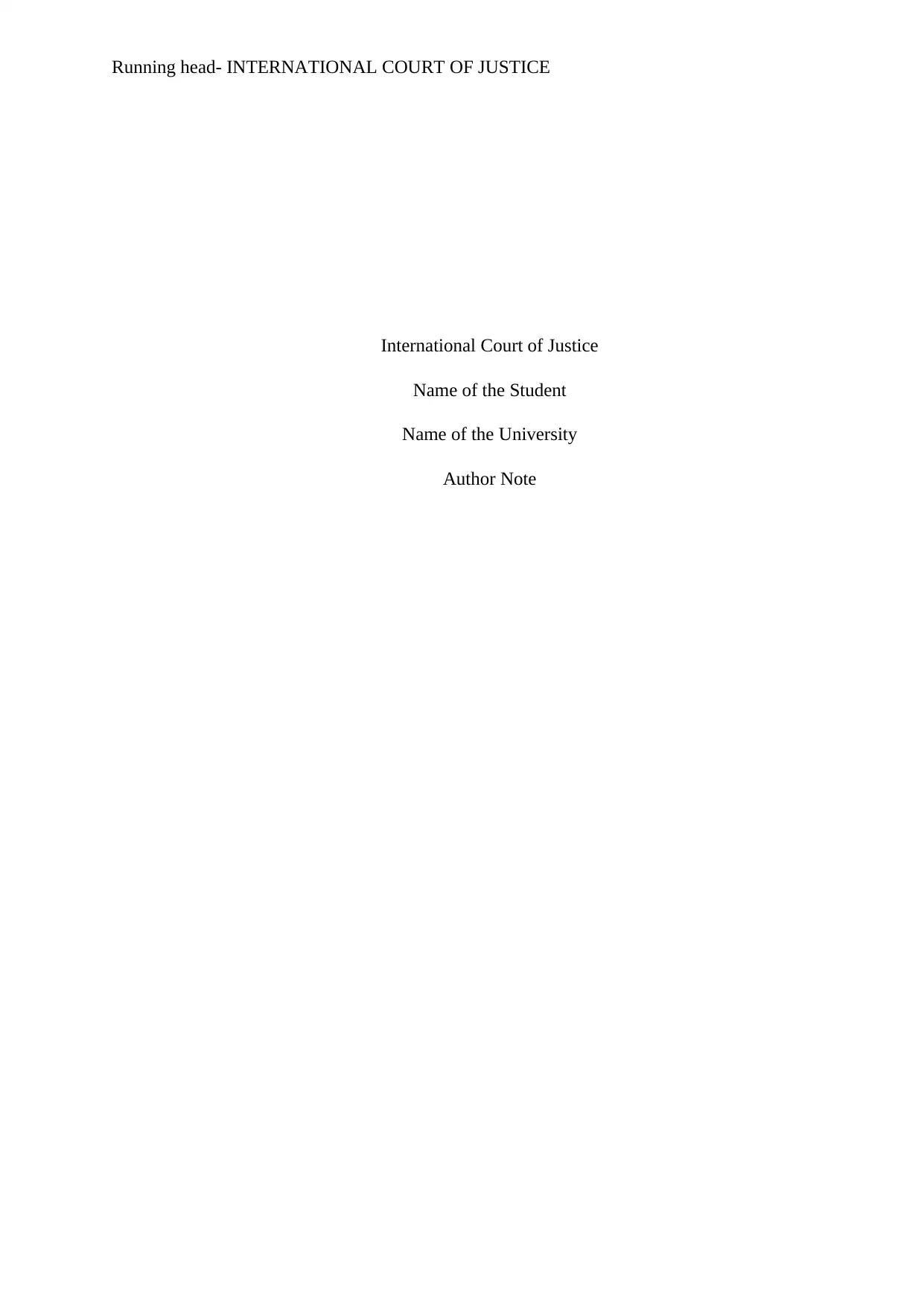
Running head- INTERNATIONAL COURT OF JUSTICE
International Court of Justice
Name of the Student
Name of the University
Author Note
International Court of Justice
Name of the Student
Name of the University
Author Note
Paraphrase This Document
Need a fresh take? Get an instant paraphrase of this document with our AI Paraphraser
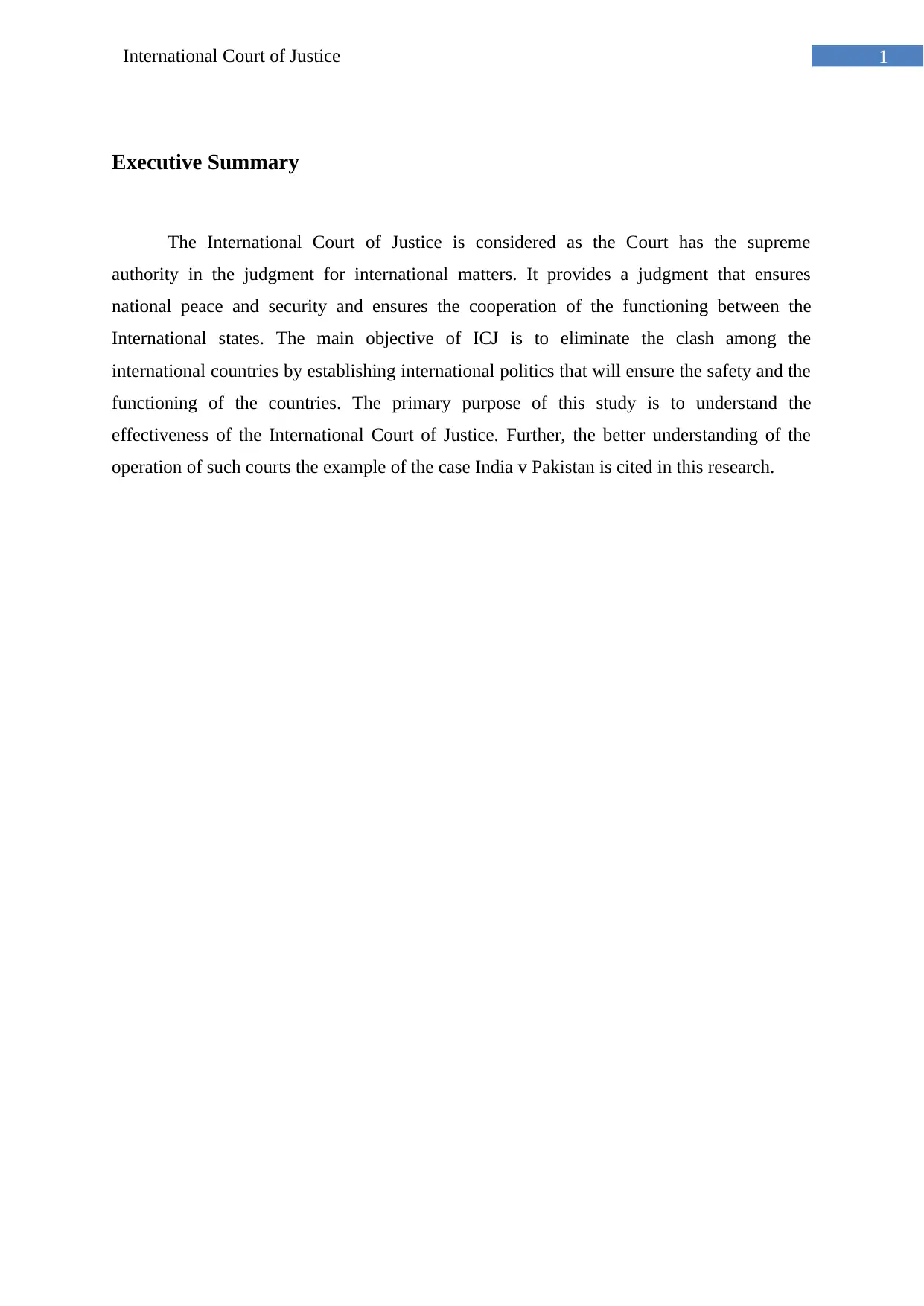
1International Court of Justice
Executive Summary
The International Court of Justice is considered as the Court has the supreme
authority in the judgment for international matters. It provides a judgment that ensures
national peace and security and ensures the cooperation of the functioning between the
International states. The main objective of ICJ is to eliminate the clash among the
international countries by establishing international politics that will ensure the safety and the
functioning of the countries. The primary purpose of this study is to understand the
effectiveness of the International Court of Justice. Further, the better understanding of the
operation of such courts the example of the case India v Pakistan is cited in this research.
Executive Summary
The International Court of Justice is considered as the Court has the supreme
authority in the judgment for international matters. It provides a judgment that ensures
national peace and security and ensures the cooperation of the functioning between the
International states. The main objective of ICJ is to eliminate the clash among the
international countries by establishing international politics that will ensure the safety and the
functioning of the countries. The primary purpose of this study is to understand the
effectiveness of the International Court of Justice. Further, the better understanding of the
operation of such courts the example of the case India v Pakistan is cited in this research.
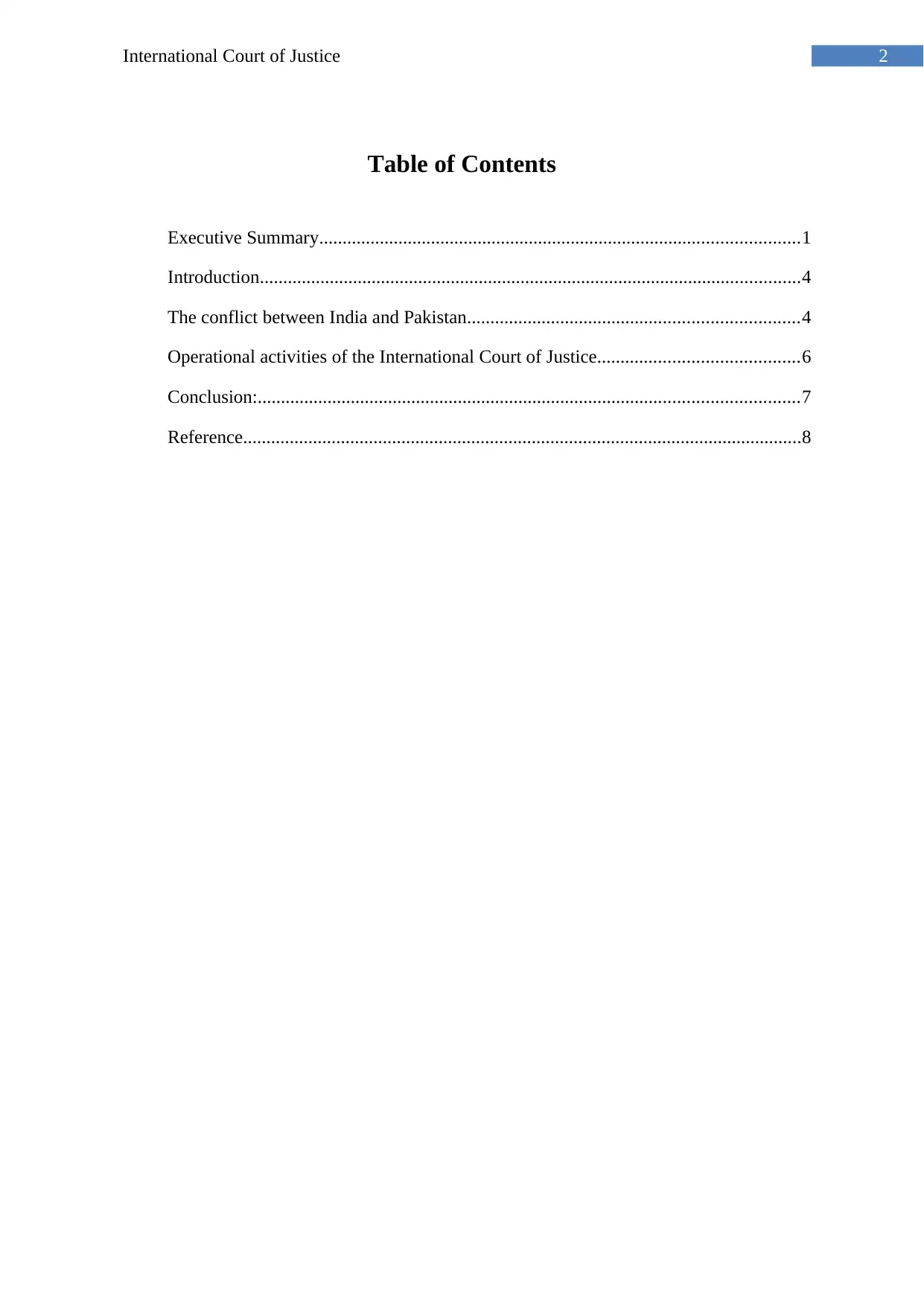
2International Court of Justice
Table of Contents
Executive Summary.......................................................................................................1
Introduction....................................................................................................................4
The conflict between India and Pakistan.......................................................................4
Operational activities of the International Court of Justice...........................................6
Conclusion:....................................................................................................................7
Reference........................................................................................................................8
Table of Contents
Executive Summary.......................................................................................................1
Introduction....................................................................................................................4
The conflict between India and Pakistan.......................................................................4
Operational activities of the International Court of Justice...........................................6
Conclusion:....................................................................................................................7
Reference........................................................................................................................8
⊘ This is a preview!⊘
Do you want full access?
Subscribe today to unlock all pages.

Trusted by 1+ million students worldwide
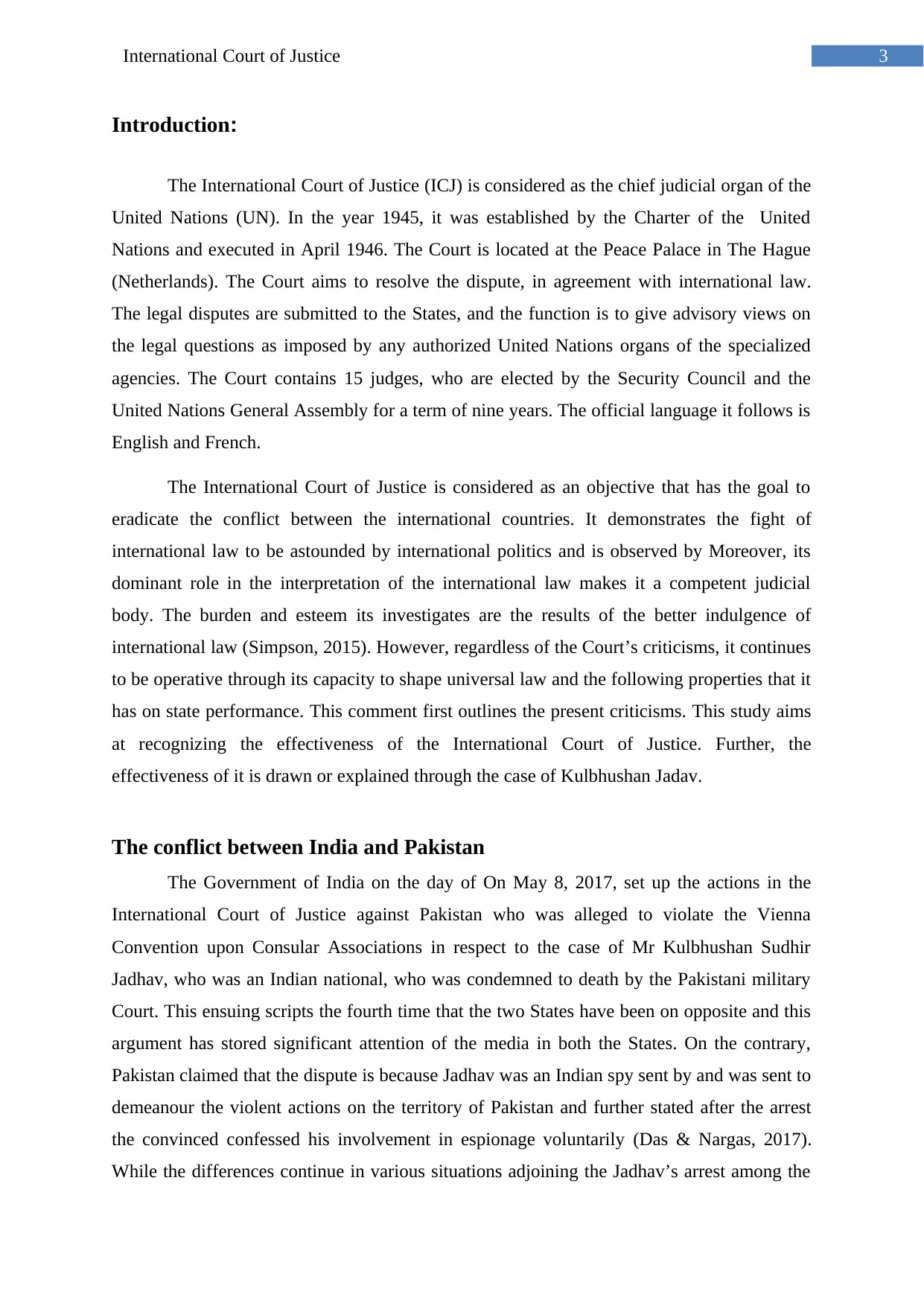
3International Court of Justice
Introduction:
The International Court of Justice (ICJ) is considered as the chief judicial organ of the
United Nations (UN). In the year 1945, it was established by the Charter of the United
Nations and executed in April 1946. The Court is located at the Peace Palace in The Hague
(Netherlands). The Court aims to resolve the dispute, in agreement with international law.
The legal disputes are submitted to the States, and the function is to give advisory views on
the legal questions as imposed by any authorized United Nations organs of the specialized
agencies. The Court contains 15 judges, who are elected by the Security Council and the
United Nations General Assembly for a term of nine years. The official language it follows is
English and French.
The International Court of Justice is considered as an objective that has the goal to
eradicate the conflict between the international countries. It demonstrates the fight of
international law to be astounded by international politics and is observed by Moreover, its
dominant role in the interpretation of the international law makes it a competent judicial
body. The burden and esteem its investigates are the results of the better indulgence of
international law (Simpson, 2015). However, regardless of the Court’s criticisms, it continues
to be operative through its capacity to shape universal law and the following properties that it
has on state performance. This comment first outlines the present criticisms. This study aims
at recognizing the effectiveness of the International Court of Justice. Further, the
effectiveness of it is drawn or explained through the case of Kulbhushan Jadav.
The conflict between India and Pakistan
The Government of India on the day of On May 8, 2017, set up the actions in the
International Court of Justice against Pakistan who was alleged to violate the Vienna
Convention upon Consular Associations in respect to the case of Mr Kulbhushan Sudhir
Jadhav, who was an Indian national, who was condemned to death by the Pakistani military
Court. This ensuing scripts the fourth time that the two States have been on opposite and this
argument has stored significant attention of the media in both the States. On the contrary,
Pakistan claimed that the dispute is because Jadhav was an Indian spy sent by and was sent to
demeanour the violent actions on the territory of Pakistan and further stated after the arrest
the convinced confessed his involvement in espionage voluntarily (Das & Nargas, 2017).
While the differences continue in various situations adjoining the Jadhav’s arrest among the
Introduction:
The International Court of Justice (ICJ) is considered as the chief judicial organ of the
United Nations (UN). In the year 1945, it was established by the Charter of the United
Nations and executed in April 1946. The Court is located at the Peace Palace in The Hague
(Netherlands). The Court aims to resolve the dispute, in agreement with international law.
The legal disputes are submitted to the States, and the function is to give advisory views on
the legal questions as imposed by any authorized United Nations organs of the specialized
agencies. The Court contains 15 judges, who are elected by the Security Council and the
United Nations General Assembly for a term of nine years. The official language it follows is
English and French.
The International Court of Justice is considered as an objective that has the goal to
eradicate the conflict between the international countries. It demonstrates the fight of
international law to be astounded by international politics and is observed by Moreover, its
dominant role in the interpretation of the international law makes it a competent judicial
body. The burden and esteem its investigates are the results of the better indulgence of
international law (Simpson, 2015). However, regardless of the Court’s criticisms, it continues
to be operative through its capacity to shape universal law and the following properties that it
has on state performance. This comment first outlines the present criticisms. This study aims
at recognizing the effectiveness of the International Court of Justice. Further, the
effectiveness of it is drawn or explained through the case of Kulbhushan Jadav.
The conflict between India and Pakistan
The Government of India on the day of On May 8, 2017, set up the actions in the
International Court of Justice against Pakistan who was alleged to violate the Vienna
Convention upon Consular Associations in respect to the case of Mr Kulbhushan Sudhir
Jadhav, who was an Indian national, who was condemned to death by the Pakistani military
Court. This ensuing scripts the fourth time that the two States have been on opposite and this
argument has stored significant attention of the media in both the States. On the contrary,
Pakistan claimed that the dispute is because Jadhav was an Indian spy sent by and was sent to
demeanour the violent actions on the territory of Pakistan and further stated after the arrest
the convinced confessed his involvement in espionage voluntarily (Das & Nargas, 2017).
While the differences continue in various situations adjoining the Jadhav’s arrest among the
Paraphrase This Document
Need a fresh take? Get an instant paraphrase of this document with our AI Paraphraser
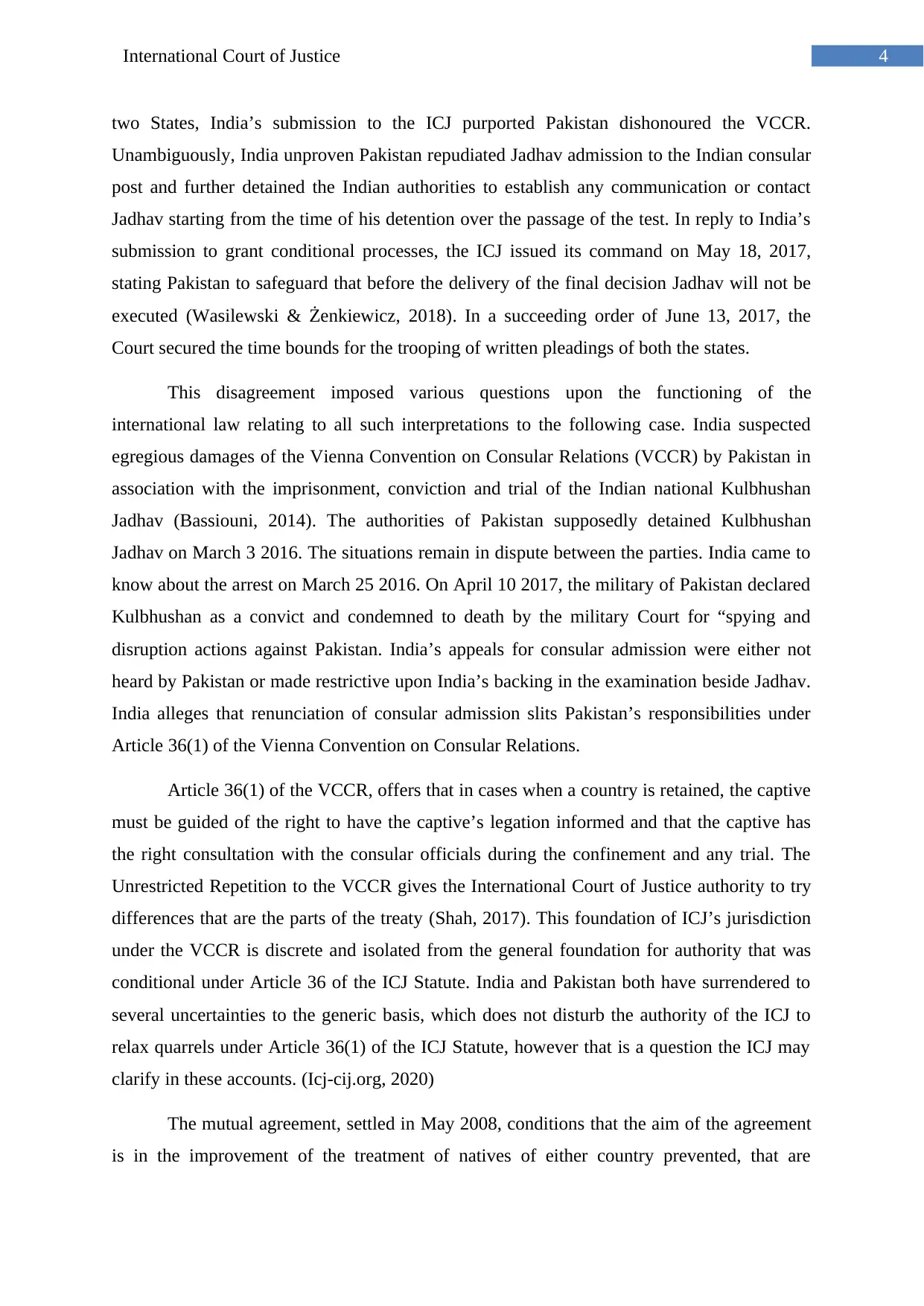
4International Court of Justice
two States, India’s submission to the ICJ purported Pakistan dishonoured the VCCR.
Unambiguously, India unproven Pakistan repudiated Jadhav admission to the Indian consular
post and further detained the Indian authorities to establish any communication or contact
Jadhav starting from the time of his detention over the passage of the test. In reply to India’s
submission to grant conditional processes, the ICJ issued its command on May 18, 2017,
stating Pakistan to safeguard that before the delivery of the final decision Jadhav will not be
executed (Wasilewski & Żenkiewicz, 2018). In a succeeding order of June 13, 2017, the
Court secured the time bounds for the trooping of written pleadings of both the states.
This disagreement imposed various questions upon the functioning of the
international law relating to all such interpretations to the following case. India suspected
egregious damages of the Vienna Convention on Consular Relations (VCCR) by Pakistan in
association with the imprisonment, conviction and trial of the Indian national Kulbhushan
Jadhav (Bassiouni, 2014). The authorities of Pakistan supposedly detained Kulbhushan
Jadhav on March 3 2016. The situations remain in dispute between the parties. India came to
know about the arrest on March 25 2016. On April 10 2017, the military of Pakistan declared
Kulbhushan as a convict and condemned to death by the military Court for “spying and
disruption actions against Pakistan. India’s appeals for consular admission were either not
heard by Pakistan or made restrictive upon India’s backing in the examination beside Jadhav.
India alleges that renunciation of consular admission slits Pakistan’s responsibilities under
Article 36(1) of the Vienna Convention on Consular Relations.
Article 36(1) of the VCCR, offers that in cases when a country is retained, the captive
must be guided of the right to have the captive’s legation informed and that the captive has
the right consultation with the consular officials during the confinement and any trial. The
Unrestricted Repetition to the VCCR gives the International Court of Justice authority to try
differences that are the parts of the treaty (Shah, 2017). This foundation of ICJ’s jurisdiction
under the VCCR is discrete and isolated from the general foundation for authority that was
conditional under Article 36 of the ICJ Statute. India and Pakistan both have surrendered to
several uncertainties to the generic basis, which does not disturb the authority of the ICJ to
relax quarrels under Article 36(1) of the ICJ Statute, however that is a question the ICJ may
clarify in these accounts. (Icj-cij.org, 2020)
The mutual agreement, settled in May 2008, conditions that the aim of the agreement
is in the improvement of the treatment of natives of either country prevented, that are
two States, India’s submission to the ICJ purported Pakistan dishonoured the VCCR.
Unambiguously, India unproven Pakistan repudiated Jadhav admission to the Indian consular
post and further detained the Indian authorities to establish any communication or contact
Jadhav starting from the time of his detention over the passage of the test. In reply to India’s
submission to grant conditional processes, the ICJ issued its command on May 18, 2017,
stating Pakistan to safeguard that before the delivery of the final decision Jadhav will not be
executed (Wasilewski & Żenkiewicz, 2018). In a succeeding order of June 13, 2017, the
Court secured the time bounds for the trooping of written pleadings of both the states.
This disagreement imposed various questions upon the functioning of the
international law relating to all such interpretations to the following case. India suspected
egregious damages of the Vienna Convention on Consular Relations (VCCR) by Pakistan in
association with the imprisonment, conviction and trial of the Indian national Kulbhushan
Jadhav (Bassiouni, 2014). The authorities of Pakistan supposedly detained Kulbhushan
Jadhav on March 3 2016. The situations remain in dispute between the parties. India came to
know about the arrest on March 25 2016. On April 10 2017, the military of Pakistan declared
Kulbhushan as a convict and condemned to death by the military Court for “spying and
disruption actions against Pakistan. India’s appeals for consular admission were either not
heard by Pakistan or made restrictive upon India’s backing in the examination beside Jadhav.
India alleges that renunciation of consular admission slits Pakistan’s responsibilities under
Article 36(1) of the Vienna Convention on Consular Relations.
Article 36(1) of the VCCR, offers that in cases when a country is retained, the captive
must be guided of the right to have the captive’s legation informed and that the captive has
the right consultation with the consular officials during the confinement and any trial. The
Unrestricted Repetition to the VCCR gives the International Court of Justice authority to try
differences that are the parts of the treaty (Shah, 2017). This foundation of ICJ’s jurisdiction
under the VCCR is discrete and isolated from the general foundation for authority that was
conditional under Article 36 of the ICJ Statute. India and Pakistan both have surrendered to
several uncertainties to the generic basis, which does not disturb the authority of the ICJ to
relax quarrels under Article 36(1) of the ICJ Statute, however that is a question the ICJ may
clarify in these accounts. (Icj-cij.org, 2020)
The mutual agreement, settled in May 2008, conditions that the aim of the agreement
is in the improvement of the treatment of natives of either country prevented, that are
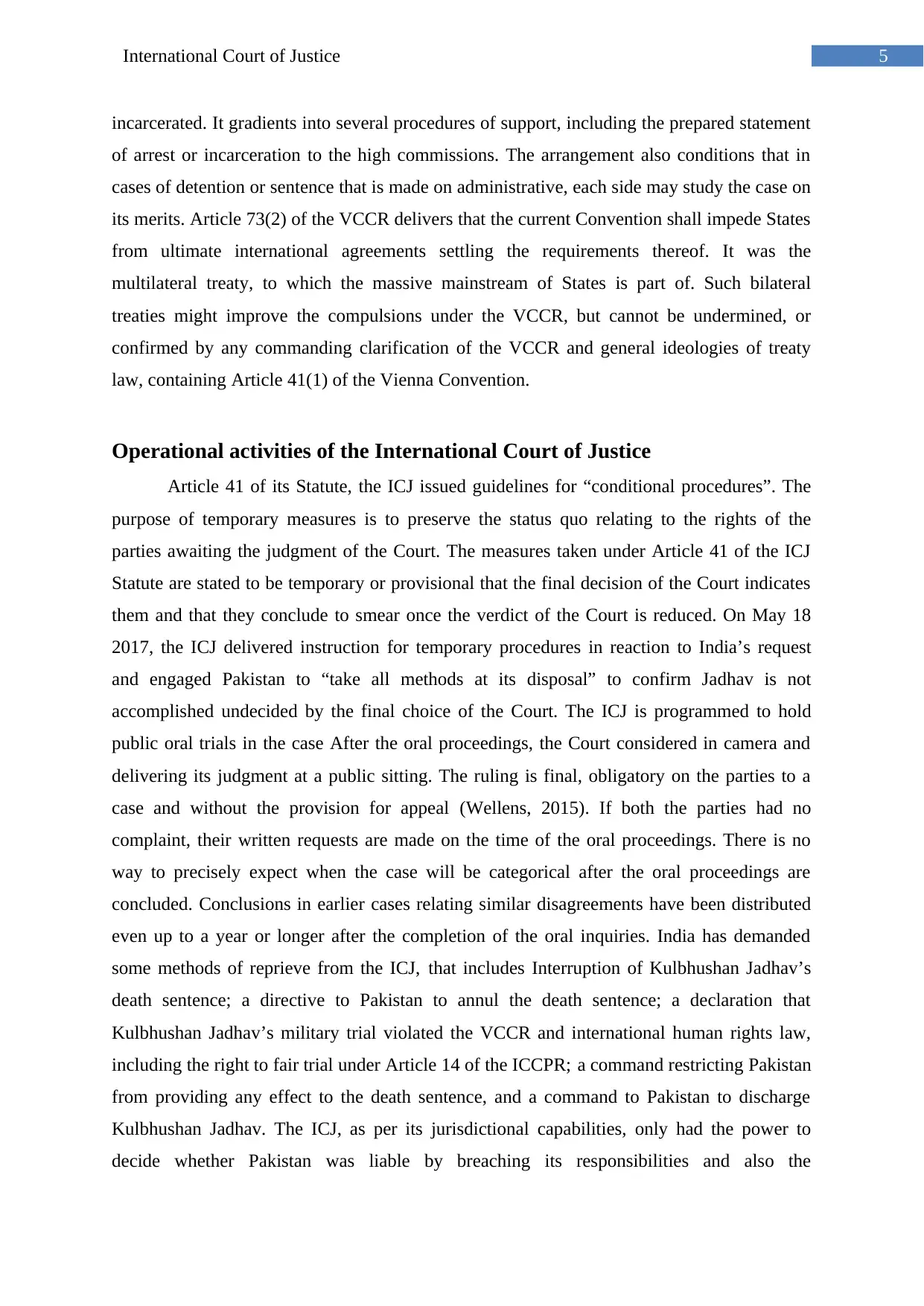
5International Court of Justice
incarcerated. It gradients into several procedures of support, including the prepared statement
of arrest or incarceration to the high commissions. The arrangement also conditions that in
cases of detention or sentence that is made on administrative, each side may study the case on
its merits. Article 73(2) of the VCCR delivers that the current Convention shall impede States
from ultimate international agreements settling the requirements thereof. It was the
multilateral treaty, to which the massive mainstream of States is part of. Such bilateral
treaties might improve the compulsions under the VCCR, but cannot be undermined, or
confirmed by any commanding clarification of the VCCR and general ideologies of treaty
law, containing Article 41(1) of the Vienna Convention.
Operational activities of the International Court of Justice
Article 41 of its Statute, the ICJ issued guidelines for “conditional procedures”. The
purpose of temporary measures is to preserve the status quo relating to the rights of the
parties awaiting the judgment of the Court. The measures taken under Article 41 of the ICJ
Statute are stated to be temporary or provisional that the final decision of the Court indicates
them and that they conclude to smear once the verdict of the Court is reduced. On May 18
2017, the ICJ delivered instruction for temporary procedures in reaction to India’s request
and engaged Pakistan to “take all methods at its disposal” to confirm Jadhav is not
accomplished undecided by the final choice of the Court. The ICJ is programmed to hold
public oral trials in the case After the oral proceedings, the Court considered in camera and
delivering its judgment at a public sitting. The ruling is final, obligatory on the parties to a
case and without the provision for appeal (Wellens, 2015). If both the parties had no
complaint, their written requests are made on the time of the oral proceedings. There is no
way to precisely expect when the case will be categorical after the oral proceedings are
concluded. Conclusions in earlier cases relating similar disagreements have been distributed
even up to a year or longer after the completion of the oral inquiries. India has demanded
some methods of reprieve from the ICJ, “that includes Interruption of Kulbhushan Jadhav’s
death sentence; a directive to Pakistan to annul the death sentence; a declaration that
Kulbhushan Jadhav’s military trial violated the VCCR and international human rights law,
including the right to fair trial under Article 14 of the ICCPR;” a command restricting Pakistan
from providing any effect to the death sentence, and a command to Pakistan to discharge
Kulbhushan Jadhav. The ICJ, as per its jurisdictional capabilities, only had the power to
decide whether Pakistan was liable by breaching its responsibilities and also the
incarcerated. It gradients into several procedures of support, including the prepared statement
of arrest or incarceration to the high commissions. The arrangement also conditions that in
cases of detention or sentence that is made on administrative, each side may study the case on
its merits. Article 73(2) of the VCCR delivers that the current Convention shall impede States
from ultimate international agreements settling the requirements thereof. It was the
multilateral treaty, to which the massive mainstream of States is part of. Such bilateral
treaties might improve the compulsions under the VCCR, but cannot be undermined, or
confirmed by any commanding clarification of the VCCR and general ideologies of treaty
law, containing Article 41(1) of the Vienna Convention.
Operational activities of the International Court of Justice
Article 41 of its Statute, the ICJ issued guidelines for “conditional procedures”. The
purpose of temporary measures is to preserve the status quo relating to the rights of the
parties awaiting the judgment of the Court. The measures taken under Article 41 of the ICJ
Statute are stated to be temporary or provisional that the final decision of the Court indicates
them and that they conclude to smear once the verdict of the Court is reduced. On May 18
2017, the ICJ delivered instruction for temporary procedures in reaction to India’s request
and engaged Pakistan to “take all methods at its disposal” to confirm Jadhav is not
accomplished undecided by the final choice of the Court. The ICJ is programmed to hold
public oral trials in the case After the oral proceedings, the Court considered in camera and
delivering its judgment at a public sitting. The ruling is final, obligatory on the parties to a
case and without the provision for appeal (Wellens, 2015). If both the parties had no
complaint, their written requests are made on the time of the oral proceedings. There is no
way to precisely expect when the case will be categorical after the oral proceedings are
concluded. Conclusions in earlier cases relating similar disagreements have been distributed
even up to a year or longer after the completion of the oral inquiries. India has demanded
some methods of reprieve from the ICJ, “that includes Interruption of Kulbhushan Jadhav’s
death sentence; a directive to Pakistan to annul the death sentence; a declaration that
Kulbhushan Jadhav’s military trial violated the VCCR and international human rights law,
including the right to fair trial under Article 14 of the ICCPR;” a command restricting Pakistan
from providing any effect to the death sentence, and a command to Pakistan to discharge
Kulbhushan Jadhav. The ICJ, as per its jurisdictional capabilities, only had the power to
decide whether Pakistan was liable by breaching its responsibilities and also the
⊘ This is a preview!⊘
Do you want full access?
Subscribe today to unlock all pages.

Trusted by 1+ million students worldwide
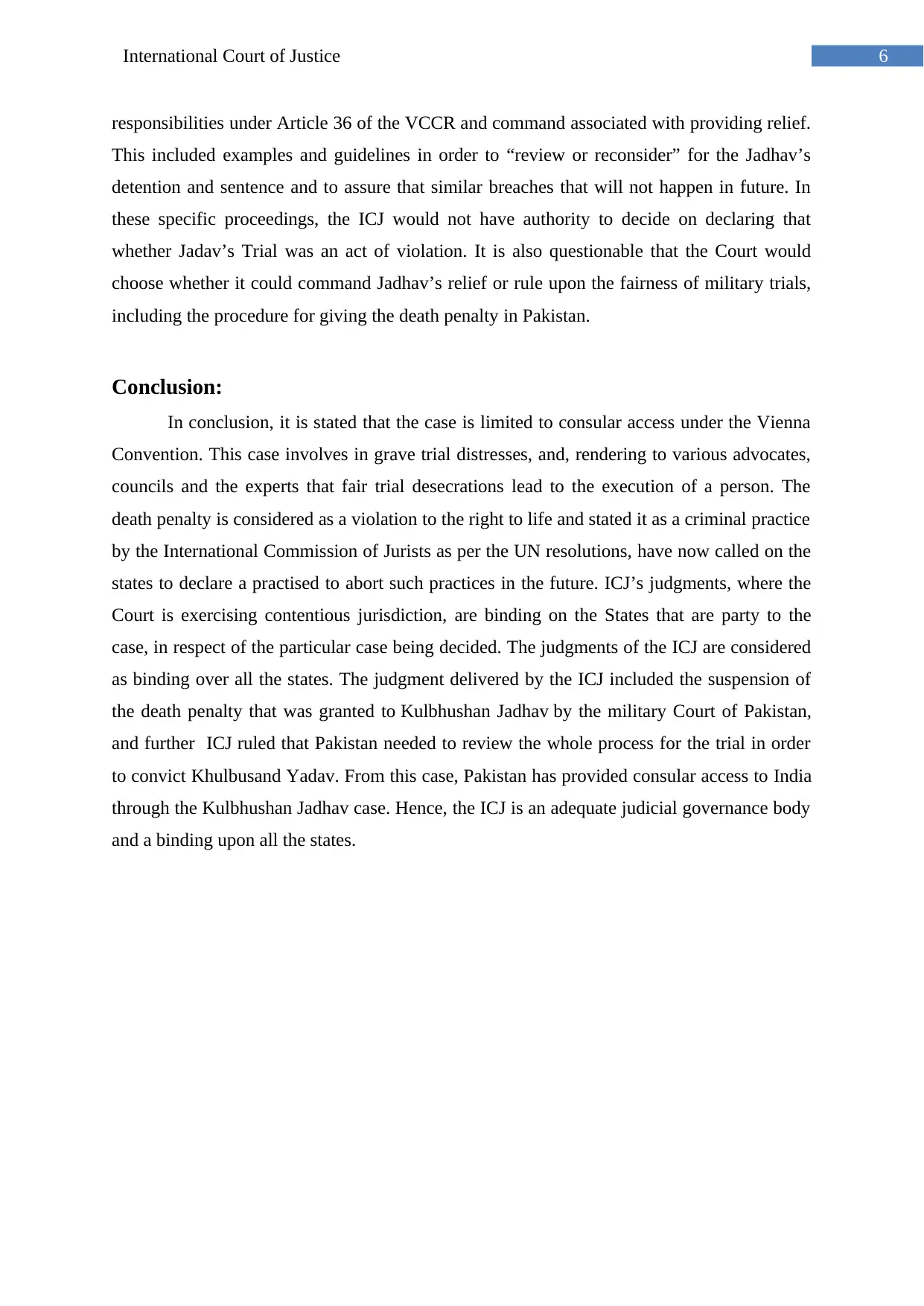
6International Court of Justice
responsibilities under Article 36 of the VCCR and command associated with providing relief.
This included examples and guidelines in order to “review or reconsider” for the Jadhav’s
detention and sentence and to assure that similar breaches that will not happen in future. In
these specific proceedings, the ICJ would not have authority to decide on declaring that
whether Jadav’s Trial was an act of violation. It is also questionable that the Court would
choose whether it could command Jadhav’s relief or rule upon the fairness of military trials,
including the procedure for giving the death penalty in Pakistan.
Conclusion:
In conclusion, it is stated that the case is limited to consular access under the Vienna
Convention. This case involves in grave trial distresses, and, rendering to various advocates,
councils and the experts that fair trial desecrations lead to the execution of a person. The
death penalty is considered as a violation to the right to life and stated it as a criminal practice
by the International Commission of Jurists as per the UN resolutions, have now called on the
states to declare a practised to abort such practices in the future. ICJ’s judgments, where the
Court is exercising contentious jurisdiction, are binding on the States that are party to the
case, in respect of the particular case being decided. The judgments of the ICJ are considered
as binding over all the states. The judgment delivered by the ICJ included the suspension of
the death penalty that was granted to Kulbhushan Jadhav by the military Court of Pakistan,
and further ICJ ruled that Pakistan needed to review the whole process for the trial in order
to convict Khulbusand Yadav. From this case, Pakistan has provided consular access to India
through the Kulbhushan Jadhav case. Hence, the ICJ is an adequate judicial governance body
and a binding upon all the states.
responsibilities under Article 36 of the VCCR and command associated with providing relief.
This included examples and guidelines in order to “review or reconsider” for the Jadhav’s
detention and sentence and to assure that similar breaches that will not happen in future. In
these specific proceedings, the ICJ would not have authority to decide on declaring that
whether Jadav’s Trial was an act of violation. It is also questionable that the Court would
choose whether it could command Jadhav’s relief or rule upon the fairness of military trials,
including the procedure for giving the death penalty in Pakistan.
Conclusion:
In conclusion, it is stated that the case is limited to consular access under the Vienna
Convention. This case involves in grave trial distresses, and, rendering to various advocates,
councils and the experts that fair trial desecrations lead to the execution of a person. The
death penalty is considered as a violation to the right to life and stated it as a criminal practice
by the International Commission of Jurists as per the UN resolutions, have now called on the
states to declare a practised to abort such practices in the future. ICJ’s judgments, where the
Court is exercising contentious jurisdiction, are binding on the States that are party to the
case, in respect of the particular case being decided. The judgments of the ICJ are considered
as binding over all the states. The judgment delivered by the ICJ included the suspension of
the death penalty that was granted to Kulbhushan Jadhav by the military Court of Pakistan,
and further ICJ ruled that Pakistan needed to review the whole process for the trial in order
to convict Khulbusand Yadav. From this case, Pakistan has provided consular access to India
through the Kulbhushan Jadhav case. Hence, the ICJ is an adequate judicial governance body
and a binding upon all the states.
Paraphrase This Document
Need a fresh take? Get an instant paraphrase of this document with our AI Paraphraser
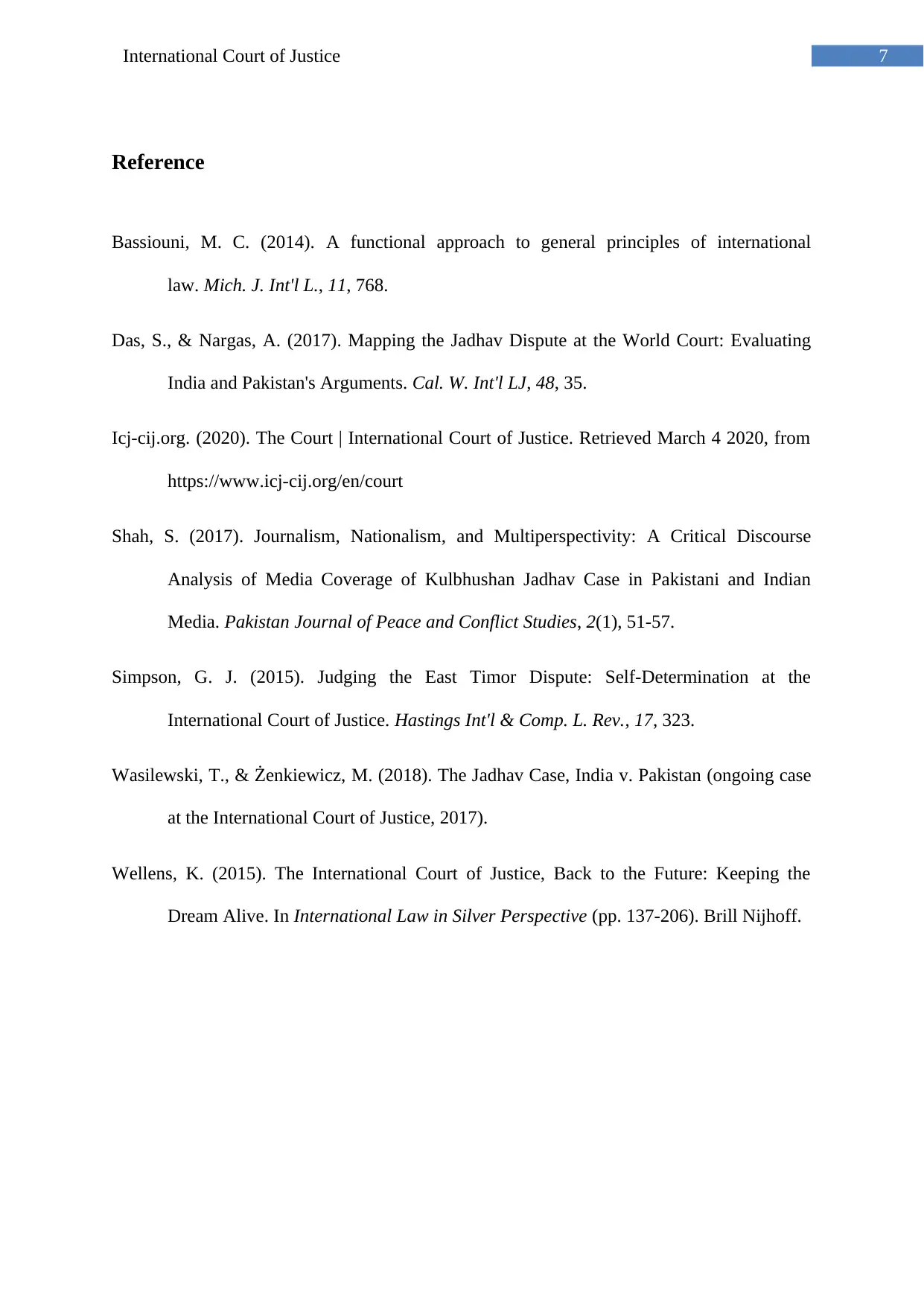
7International Court of Justice
Reference
Bassiouni, M. C. (2014). A functional approach to general principles of international
law. Mich. J. Int'l L., 11, 768.
Das, S., & Nargas, A. (2017). Mapping the Jadhav Dispute at the World Court: Evaluating
India and Pakistan's Arguments. Cal. W. Int'l LJ, 48, 35.
Icj-cij.org. (2020). The Court | International Court of Justice. Retrieved March 4 2020, from
https://www.icj-cij.org/en/court
Shah, S. (2017). Journalism, Nationalism, and Multiperspectivity: A Critical Discourse
Analysis of Media Coverage of Kulbhushan Jadhav Case in Pakistani and Indian
Media. Pakistan Journal of Peace and Conflict Studies, 2(1), 51-57.
Simpson, G. J. (2015). Judging the East Timor Dispute: Self-Determination at the
International Court of Justice. Hastings Int'l & Comp. L. Rev., 17, 323.
Wasilewski, T., & Żenkiewicz, M. (2018). The Jadhav Case, India v. Pakistan (ongoing case
at the International Court of Justice, 2017).
Wellens, K. (2015). The International Court of Justice, Back to the Future: Keeping the
Dream Alive. In International Law in Silver Perspective (pp. 137-206). Brill Nijhoff.
Reference
Bassiouni, M. C. (2014). A functional approach to general principles of international
law. Mich. J. Int'l L., 11, 768.
Das, S., & Nargas, A. (2017). Mapping the Jadhav Dispute at the World Court: Evaluating
India and Pakistan's Arguments. Cal. W. Int'l LJ, 48, 35.
Icj-cij.org. (2020). The Court | International Court of Justice. Retrieved March 4 2020, from
https://www.icj-cij.org/en/court
Shah, S. (2017). Journalism, Nationalism, and Multiperspectivity: A Critical Discourse
Analysis of Media Coverage of Kulbhushan Jadhav Case in Pakistani and Indian
Media. Pakistan Journal of Peace and Conflict Studies, 2(1), 51-57.
Simpson, G. J. (2015). Judging the East Timor Dispute: Self-Determination at the
International Court of Justice. Hastings Int'l & Comp. L. Rev., 17, 323.
Wasilewski, T., & Żenkiewicz, M. (2018). The Jadhav Case, India v. Pakistan (ongoing case
at the International Court of Justice, 2017).
Wellens, K. (2015). The International Court of Justice, Back to the Future: Keeping the
Dream Alive. In International Law in Silver Perspective (pp. 137-206). Brill Nijhoff.

8International Court of Justice
⊘ This is a preview!⊘
Do you want full access?
Subscribe today to unlock all pages.

Trusted by 1+ million students worldwide
1 out of 9
Related Documents
Your All-in-One AI-Powered Toolkit for Academic Success.
+13062052269
info@desklib.com
Available 24*7 on WhatsApp / Email
![[object Object]](/_next/static/media/star-bottom.7253800d.svg)
Unlock your academic potential
Copyright © 2020–2025 A2Z Services. All Rights Reserved. Developed and managed by ZUCOL.





